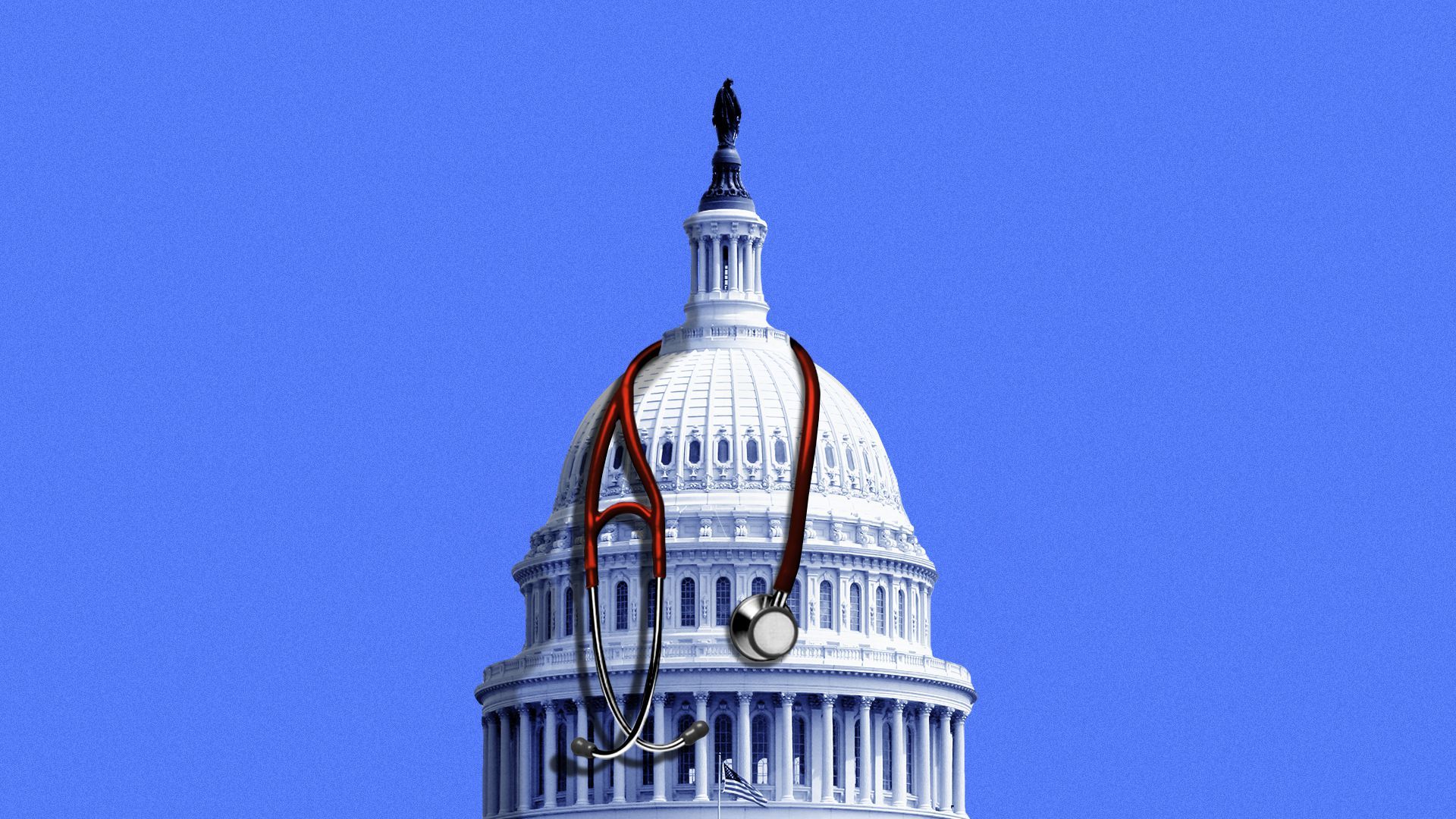Plus, the potential downside of some opioid settlements | Tuesday, May 03, 2022
| | | | | | | Presented By PhRMA | | | | Axios Vitals | | By Tina Reed · May 03, 2022 | | Good morning Vitals readers. Today's newsletter is 944 words or a 4-minute read. 👉 Check it out: Join me and Axios' Caitlin Owens tomorrow at 12:30pm ET for a virtual event looking at the prognosis for health care reform in 2022. Guests include Sen. Tom Carper (D-Del.) and MIT professor Jonathan Gruber. Register here. | | | | | | 1 big thing: The rise of health-related travel benefits |  | | | Illustration: Aïda Amer/Axios | | | | Employers that reimburse workers who travel for reproductive care may be a response to the current political climate, but it's only the latest way in which they're adding medical travel to their list of benefits, Axios' Caitlin Owens writes. The big picture: Rising health care costs drove employers to design policies that make cheaper or higher-quality services accessible long before the wave of red-state abortion restrictions. - The rise of remote work brought on by the pandemic, the shuttering of rural health services and the advent of complicated new health technologies may drive more employers to pay for workers to receive care that's far from home.
Driving the news: Amazon yesterday became the latest employer to announce that it will reimburse employees for travel connected with accessing abortions. - But Amazon's policy isn't limited just to reproductive care — it applies generally to non-life-threatening treatments, like cardiology, gene therapies and substance use disorder services, Reuters reports.
Between the lines: Amazon's new policy addresses physical access issues, which may become more common beyond the realm of reproductive health. - The pandemic has ushered in a much higher prevalence of remote work and a surge of people moving away from big cities.
- At the same time, rural hospitals continue to close or struggle to continue providing critical services.
- Technological innovations have brought groundbreaking new treatments to market, including gene therapies, but they're not offered everywhere, meaning many Americans can be shut out.
What they're saying: Companies are "certainly looking at" medical travel benefits, said James Klein, president of the American Benefits Council. "They spend a lot of money on this. They want patients to get the kind of care that gets them back to work quicker and healthier and happier." Share this story. |     | | | | | | 2. What post-Roe abortion access would look like |  Data: Axios Research; Cartogram: Sara Wise and Oriana Gonzalez/Axios The U.S. Supreme Court may overturn Roe v. Wade, according to a leaked draft document first published by Politico. Why it matters: Abortion would immediately become illegal in at least 13 states if the Supreme Court were to overturn Roe v. Wade, and more would likely follow suit quickly, according to Axios' Oriana Gonzalez. - "The authority to regulate abortion must be returned to the people and their elected representatives," per the draft.
- Axios cannot verify the document, reportedly authored by Justice Samuel Alito in February. Politico reported that Justices Clarence Thomas, Neil Gorsuch, Brett Kavanaugh and Amy Coney Barrett voted with Alito.
|     | | | | | | 3. Settlements could lead to naloxone shortages |  | | | Illustration: Shoshana Gordon/Axios | | | | Recent opioid settlement agreements Teva Pharmaceuticals struck with three states could create shortages of treatment and opioid reversal drugs in the rest of the country, Axios' Adriel Bettelheim writes about a warning from a pair of House lawmakers to Attorney General Merrick Garland. Why it matters: Letting a single company provide free treatments to entire patient populations could limit competition and undercut physicians. Driving the news: As part of a settlement of claims it helped fuel the opioid epidemic, Teva agreed to give Texas, Florida and Rhode Island more than $220 million of the overdose drug naloxone and other opioid treatments in lieu of monetary compensation. What they're saying: Reps. Marcy Kaptur (D-Ohio) and Andy Harris (R-Md.) asked Garland whether such agreements could squelch competition in the treatment market — and how they squared with Justice Department antitrust enforcement efforts. - "These settlements span 10 or 15 years, depending on the agreement, fundamentally altering the market and stifling innovation in that space," the lawmakers wrote.
- The lawmakers also asked if DOJ has the legislative authority it needs to assess the impact the settlements will have on markets for medication-assisted treatments and naloxone.
- The letter was first obtained by Endpoints News.
Background: Teva, an Israeli drug giant, has said it's bracing to pay as much as $3.6 billion in cash and medicines to settle thousands of lawsuits stemming from the opioid crisis. |     | | | | | | A message from PhRMA | | Out-of-pocket costs create significant barriers to care | | |  | | | | New data show that 35% of insured Americans spent more on out-of-pocket costs than they could afford in the past month. Many patients are experiencing an insurance system that isn't working for those who need care. Learn how insurance is leaving patients exposed to deepening inequities. | | | | | | 4. GOP dialing back its drug price goals |  | | | Illustration: Sarah Grillo/Axios | | | | House Republicans are dialing back their drug pricing goals and abandoning direct government negotiations and other signature policies from the Trump years, Adriel writes. The big picture: A new GOP plan to lower drug costs won't become reality as long as Democrats are in charge but sets key parameters with Republicans poised to flip control of the House in the mid-term elections. What it would do: Create an out-of-pocket cap on drug spending for seniors and people with disabilities. - Ensure patients pay the same rate for physician-administered drugs in a doctor's office and for medicines provided in a hospital department.
- Prohibit "pay for delay" pharmaceutical deals, in which drug companies agree not to compete.
- Offer incentives for health plans to share drug discounts with patients "at the pharmacy counter."
- Expand use of the FDA's "accelerated approval" pathway that speeds up a drug's market entrance but has attracted heightened scrutiny.
Yes, but: The plan doesn't include some aggressive drug pricing proposals championed by the Trump administration, including direct negotiations or using prices paid by other countries — or reference pricing — to cap what the U.S. will pay for a drug. - "The plan released takes the GOP caucus back to where it was on drug pricing before the Trump administration proposed far more draconian proposals and repeatedly chastised drugmakers for their pricing," per Cowen analyst Rick Weissenstein.
What we're watching: If Democrats can't enact drug pricing measures this year via a revised Build Back Better package, major reforms will likely be off the table for a long time. |     | | | | | | 5. Expanded child tax credits hit sugar habits |  | | | Illustration: Maura Losch/Axios | | | | The temporary expansion of the Child Tax Credit during the COVID-19 pandemic in 2021 coincided with greater food security and may also have reduced children's consumption of sugary foods and beverages, according to a study in Health Affairs. - The expanded tax credit for about 35 million families expired at the end of 2021 after critics in Congress expressed concern it was preventing people from working.
Go deeper. |     | | | | | | A message from PhRMA | | Voters want Congress to address health insurance | | |  | | | | According to a new poll, 71% of Americans would like to see Congress focus more on reducing the overall costs of health care coverage such as premiums, deductibles and copays. The reason: Many believe current health insurance coverage options are confusing and unaffordable. | | |  | It's called Smart Brevity®. Over 200 orgs use it — in a tool called Axios HQ — to drive productivity with clearer workplace communications. | | | | | | Axios thanks our partners for supporting our newsletters. If you're interested in advertising, learn more here.
Sponsorship has no influence on editorial content. Axios, 3100 Clarendon Blvd, Suite 1300, Arlington VA 22201 | | | You received this email because you signed up for newsletters from Axios.
Change your preferences or unsubscribe here. | | | Was this email forwarded to you?
Sign up now to get Axios in your inbox. | | | | Follow Axios on social media:    | | | | | |









No comments:
Post a Comment